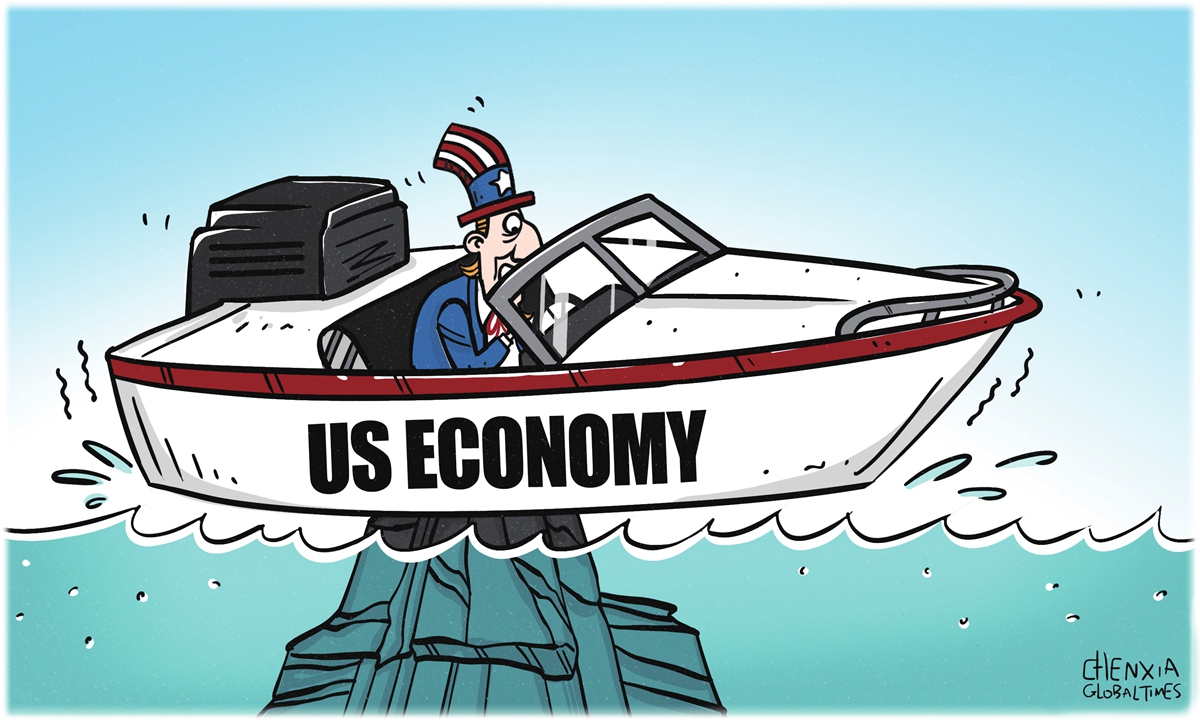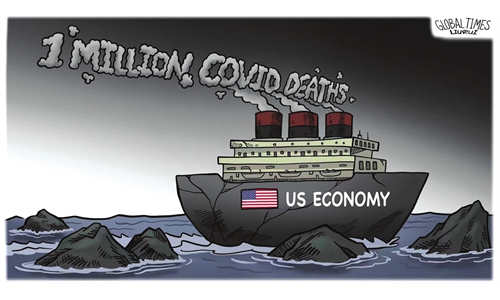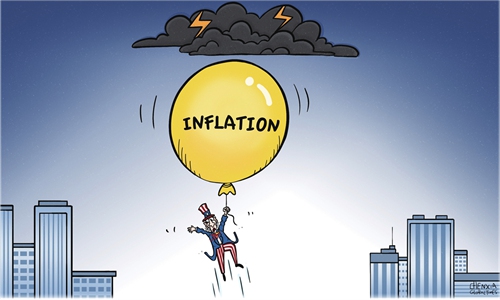US should reflect on warnings of recession

Illustration:Chen Xia/GT
The US Consumer Price Index (CPI) increased 9.1 percent year-on-year in June, the highest rate in almost 41 years and way above estimations. In fact, in the past six months, the US inflation rate has exceeded 7 percent, 8 percent, and 9 percent successively. Many economists already believe that the US economy has fallen into a technical recession.There are three main reasons for surging US inflation. First, two and a half years since the beginning of the COVID-19 epidemic, supply chains in Europe and the US have been facing great pressure. E-commerce orders are surging, while intermittent isolation and lockdown measures led to a notable rise in logistics costs and, consequently, the soaring of commodity prices.
Second, for more than two years, central banks in developed countries, especially the US, have adopted the monetary policy of "super" quantitative easing, resulting in more money printed and then currency devaluation.
Third, driven by the Russia-Ukraine conflict, the prices of commodities, particularly energy, have risen. For example, energy prices in the US grew 41.6 percent over the last year, and gasoline prices soared nearly 59.9 percent year-on-year. Now, central banks in many countries are facing a dilemma. On one hand, they want to "stabilize growth" and maintain an economic growth rate in a certain way, which requires credit and investment expansion. On the other hand, these countries must now "fight inflation," which demands raising interest rates to tighten credit further. Now, it seems that many central banks have been forced to give priority only to "fight inflation."
Economists generally predict that if relevant policies are not put in place, inflation in the US and many other developed countries will still be far from its peak: It may rise again in July and August. This has made most people in the economic community pessimistic about the future of the US economy.
Since March, the US Federal Reserve has increased interest rates three times, with the target range for the federal funds rate raised to 1.5 percent-1.75 percent. More and more people are predicting that the Fed will approve a significant 75 basis-point hike to interest rates in July, while some even say it could be 100 basis points. This will inevitably drag down US' economic growth further. Real GDP in the US fell at an annual rate of 1.6 percent in the first quarter of 2022, and the US economy will likely continue to go downward in the second quarter. This means that it is quite possible that the US economy will not only fall into a technical recession, but also into a medium- to long-term recession. This, in turn, will heighten the sense of nervousness that the entire developed world is entering a recession.
However, we are pleased to see that starting in July, the US and Europe are lifting some of their sanctions against Russia, and China-US trade talks on tariffs will begin. If the easing of sanctions and trade negotiations can continue, it should effectively control inflation. We hope that inflation will remind developed countries, especially the US, that they need to learn from some of these major lessons.
Lesson one - They should adopt a responsible fiscal and monetary policy. In response to the 2008 global financial crisis, the US pursued the coordination of macroeconomic financial policies. This tradition should be revived. Currently, it is difficult to achieve a soft landing in any crisis without thinking from the perspective of global cooperation.
Lesson two - They need to conduct effective and peaceful negotiations. Russia and Ukraine should be encouraged to negotiate with each other. The biggest obstacle to such talks now comes from the US. If Washington doesn't want the conflict to stop, it will surely suffer from the backlash of inflation and economic depression due to the conflict between Moscow and Kiev.
Lesson three - They must enhance practical and international cooperation to combat the COVID-19 epidemic. Only when the epidemic ends as soon as possible can logistics costs and the economy possibly return to normal.
In short, it is now time for the US to reflect on itself. Without reflection and policy reversion, the US economy will be in even greater trouble.
The author is executive dean of Chongyang Institute for Financial Studies at Renmin University of China. opinion@globaltimes.com.cn



